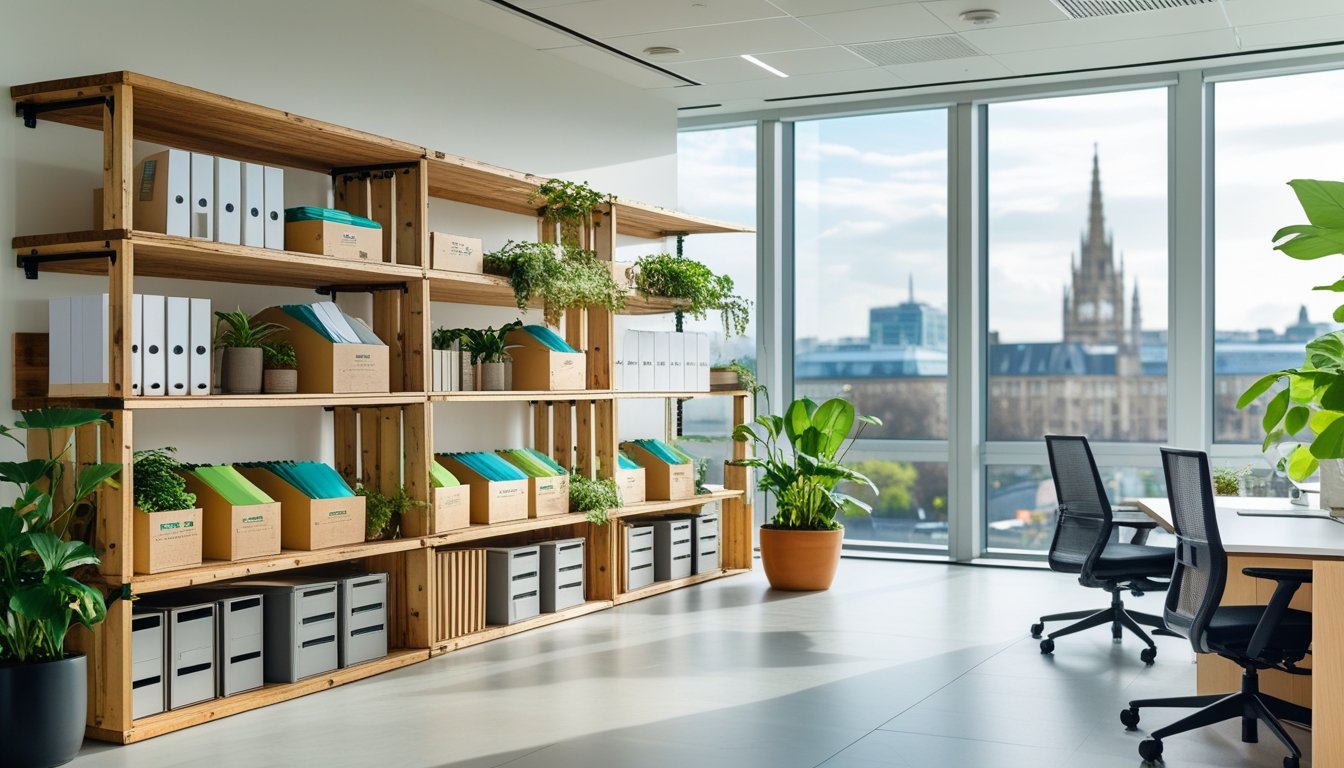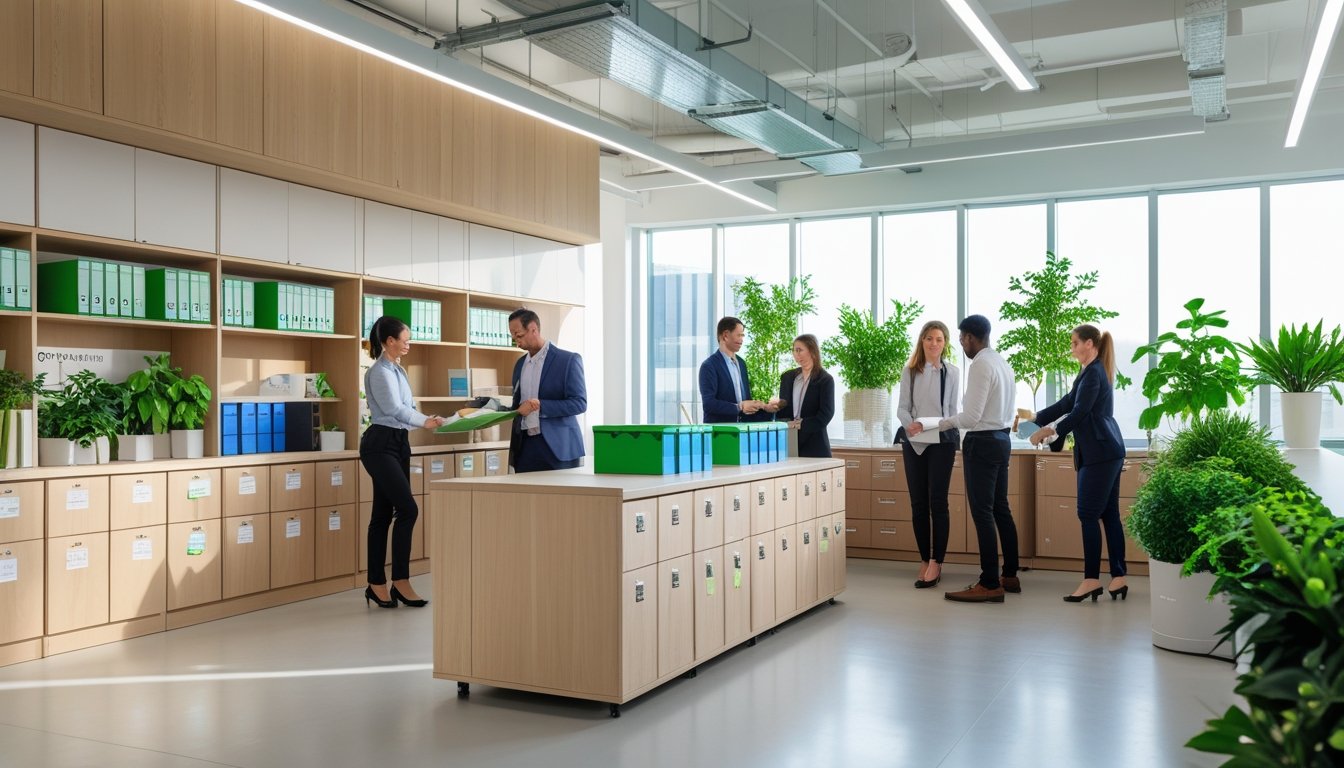Late updated: 03 Oct 2025 15:10
Written by: Amber Collins
Sustainable Office Storage Solutions For UK Businesses: Maximising Space and Efficiency
In today's competitive business landscape, achieving sustainability in office operations is more than a trend; it's a necessity. As UK businesses strive to reduce environmental impact and improve resource efficiency, adopting sustainable office storage solutions has become crucial. These solutions not only support environmental responsibility but also enhance workplace aesthetics and productivity.

Utilising sustainable materials and energy-efficient technologies forms the backbone of responsible office storage. Reused office furniture and eco-friendly storage options, like those offered by companies in the UK, help businesses easily transition to environmentally-friendly operations. By implementing these innovative approaches, we can maintain a balance between functionality, design, and sustainability.
The demand for modular and adaptable storage solutions also reflects the evolving needs of modern workplaces. Businesses can strategically manage resources while achieving cost savings and contributing to the circular economy. This shift to greener office storage practices marks a substantial step towards achieving net-zero targets and reducing resource waste.
Key Takeaways
- Sustainable office storage enhances environmental responsibility.
- Eco-friendly solutions support design and productivity.
- Efficient storage contributes to the circular economy.
Core Sustainable Office Storage Solutions for UK Businesses

In the realm of sustainable office storage, businesses in the UK are increasingly seeking solutions that blend efficiency with environmental responsibility. Let's explore various options, centred around eco-friendly products, modular systems, and innovative designs to optimise office spaces.
Eco-Friendly Office Storage Products
We see a growing trend towards using office storage products made from recycled and sustainable materials. Eco-friendly cabinets crafted from recycled wood or materials like bamboo are becoming popular. These products reflect a commitment to reducing environmental impact.
In addition, using biodegradable supplies and implementing practices, such as digital storage to reduce paper usage, also contribute to sustainability. Sustainable office furniture not only preserves resources but also enhances workplace aesthetics and functions effectively.
Modular Storage Systems for Modern Workspaces
Modular storage systems provide the adaptability that modern workspaces require. Designed to suit various office layouts, these systems allow businesses to adjust storage configurations easily. This flexibility improves space utilisation, tailoring storage solutions to specific needs.
Modular units can be dismantled and reassembled, promoting longevity and reducing waste. Customisation options enable us to choose solutions that fit with changing office environments. By integrating renewable energy options or smart technology, these systems further align with sustainability objectives.
Flexible and Space-Saving Storage Designs
Space conservation is crucial in urban office settings, and flexible storage designs address this need effectively. Vertical storage units and multipurpose furniture help maximise space use without compromising design or accessibility.
Incorporating space-saving designs not only enhances office efficiency but also aligns with eco-friendly principles by reducing the overall footprint of facilities. Such solutions are beneficial in making our workspaces functional and aesthetically pleasing.
Our focus on strategic storage designs ensures we meet both practical and environmental goals, supporting a future where businesses operate more sustainably.
Enhancing Workplace Design and Productivity Through Sustainable Storage
Sustainable storage solutions play a significant role in optimising workspace design and boosting productivity. These strategies help create a more efficient, organised, and eco-friendly environment, benefiting both businesses and employees. Let's explore how we can integrate storage seamlessly into workspace design, promote wellness through organisation, and adapt these solutions for home offices.
Integrating Storage Within Workspace Design
Effective workspace design leverages sustainable storage to create an uncluttered environment that promotes efficiency. By incorporating modular storage systems, businesses can optimise space while offering flexibility. Adjustable shelving and integrated storage units can adapt to changing needs, allowing us to make the most of available space without unnecessary waste.
Prioritising materials from recycled or sustainably sourced sources supports eco-friendly goals. Natural wood, recycled metal, and biodegradable materials are excellent choices, contributing to aesthetic appeal and sustainability. These materials align with environmentally conscious goals and enhance the overall workspace look.
Workspace Wellness and Organisation Strategies
A well-organised office contributes significantly to employee well-being and productivity. Sustainable storage solutions keep clutter to a minimum, making it easier for employees to find what they need swiftly. This organised set-up reduces stress and promotes a more focused work environment.
We can implement storage solutions that support ergonomic principles, such as eye-level shelving and easily accessible drawers. This setup encourages good posture and reduces physical strain. Using open shelving or glass-fronted cabinets can enhance visual appeal and provide transparency in storage.
Adapting Storage for Home Office and Remote Work
As remote work becomes more prevalent, adapting sustainable storage to home offices is vital. Compact, multi-functional storage solutions can help maintain organisation without overwhelming limited spaces. Examples include foldable desks with built-in storage, wall-mounted shelves, and under-desk cabinets that maximise efficiency in small areas.
We might choose storage options that blend with home decor while serving practical purposes. This approach ensures that workspaces remain inviting and harmonious with the home environment, promoting productivity and comfort. As we continue to balance remote work, incorporating sustainable storage solutions is crucial for maintaining a productive workspace at home.
Frequently Asked Questions

In our exploration of sustainable office storage solutions, we address the use of eco-friendly materials, reduction of paper waste, recycling practices, key certifications, modular designs, and the importance of carefully selecting suppliers. These elements play a vital role in achieving a sustainable office environment. Below, we provide insight into common queries on these topics.
What are the leading sustainable materials used in office storage?
Businesses often choose materials like recycled metals, sustainably sourced wood, and biodegradable composites to construct storage solutions. These materials not only lessen environmental impact but also enhance the longevity and adaptability of office storage furnishings.
How can businesses effectively reduce paper waste in their storage solutions?
Implementing digital document systems and encouraging a culture of minimal paper use are effective strategies. We can also incorporate filing systems that are made from sustainable materials, ensuring that necessary paper storage aligns with eco-friendly practices.
What are the best practices for recycling old office storage units?
Identifying partnerships with recycling services that specialise in office furniture and encouraging the resale or donation of usable items are recommended. Deconstructing materials and segregating them by type facilitates easier recycling and reduces landfill contributions.
Which certifications should be considered when selecting eco-friendly storage options?
Look for certifications such as the Forest Stewardship Council (FSC) for wood products or Cradle to Cradle for broader sustainability criteria. These labels ensure that the storage options meet high environmental and social responsibility standards.
How does modular storage contribute to a sustainable office environment?
Modular storage offers flexibility by allowing units to be expanded or rearranged as needs change, thereby reducing the demand for new materials. This adaptability supports waste reduction and efficient space utilisation, aligning with sustainable practices.
What role does supplier selection play in ensuring storage solutions are sustainable?
Choosing suppliers committed to sustainability is fundamental. This involves assessing their manufacturing processes, use of eco-friendly materials, and commitment to social responsibility. Aligning with like-minded suppliers ensures we collectively uphold environmental standards in our office storage solutions.
